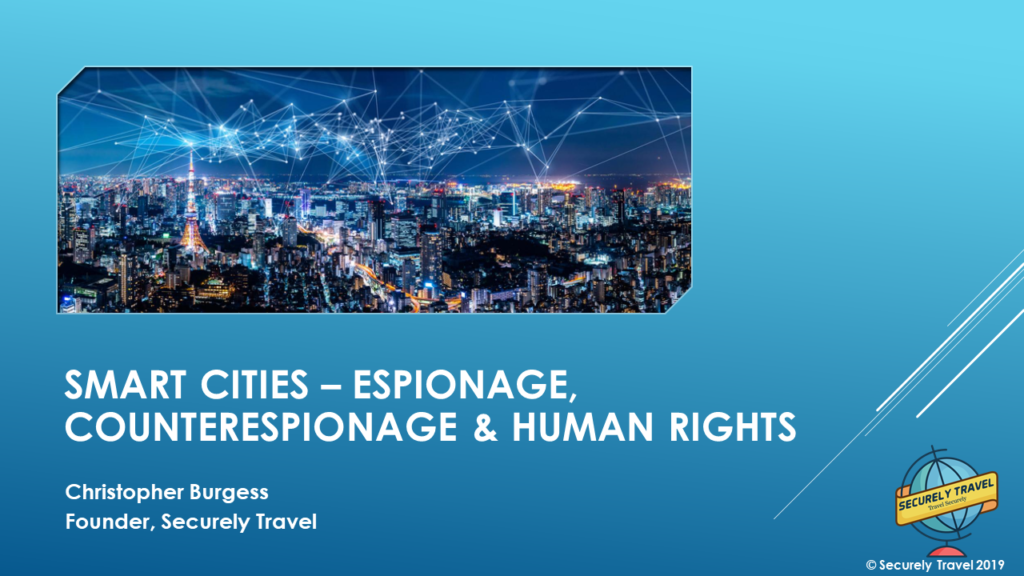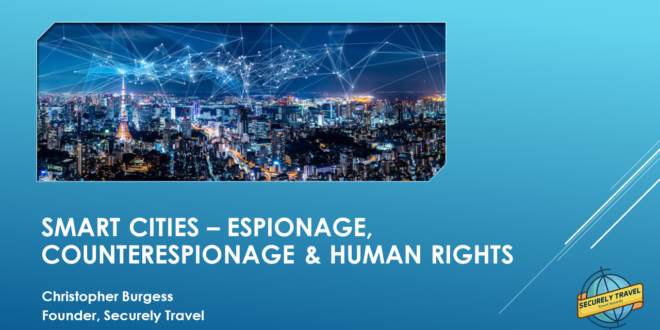The founder of Securely Travel, Christopher Burgess shared a presentation on “Smart Cities - Espionage, Counterespionage and Human Rights” at the Securing Smart Cities Mobility Summit in Seattle on 28 October 2019, hosted by Jeffrey Carr of Tellaro.
He began his presentation by discussing the state of Smart City implementation around the globe.
The October 2019 Digital Smart City Index, created by IMD and Singapore University put in rank order the most advanced 102 cities in the world.
Burgess, noted the status of Smart Cities in the United States, of which eight are among the top 100 Smart Cities in the world - San Francisco rated at number 12, Washington DC at 31, Boston at 32, Denver at 33, Seattle at 34, Los Angeles at 35, Chicago at 53, and Philadelphia at 54.
He then continued to discuss how the wealth of information collected creates a wealth of knowledge, and how those with the best analytic capability to make sense of disparate data sets will be able to provide, proactively, goods and services to their constituents.
The key takeaway from the research behind the report was how the populace is oftentimes willing to trade their personal data for the capabilities behind the goods and services and how convenience seemingly always trumps security.
Intelligence and Counterintelligence in the age of Smart Cities
This permitted a segue to the discussion on how Smart Cities may affect the capability of intelligence services, as well as law enforcement to be limited in their ability to conduct undercover operations within their own or any other environment.
A discussion on the role s of the “home team” efforts in the realm of counterintelligence and counterespionage are designed to identify leaks, control those leaks, close them off and then prosecute/expose. While the efforts of the adversary is collect information either for nation state purposes, or criminal they goals are the same.
Depending on resources and desired outcomes, the city efforts could impede the efforts of the adversary through the ubiquitous implementation of biometrics at port of entry, points of sale, public transport, etc. In addition, the ability to conduct wide-area surveillance via technical and physical means is enhanced within the fully connected city.
Due to these impediments, the short cut for criminals and intelligence officers to be successful in the Smart City environment is to control the “insider.” The employee with access to the data and the data collection capabilities.
Privacy and Human Rights
The Smart City index showed that citizens willingly trade privacy for services. The question each city needs to answer to their constituents as well as those who are traveling to the city, who owns the data?
We see the use of masks in Hong Kong by protesters forced the Hong Kong government to make such illegal. We read how China will use facial recognition as a means to keep undesirable individuals from riding public transportation. Singapore monitors every km driven by every vehicle for both taxation and travel flow control.
Does a citizen or individual have a means to opt-out of being a part of the universal data collection taking place? Does the individual have the right to disappear?
Travel in the era of Smart Cities
It is within this context that Burgess highlighted how travelers to Smart Cities have always been vulnerable, due to being in an unfamiliar environment. Governments around the world warn their employees on the need to protect their person and devices.
Securely Travel’s country briefs will now begin to include a Smart City status, so travelers may be alert to the presence of widespread collection of their activities are taking place.
The 10 slide presentation is available for download.

 Travel Securely Securely Travel
Travel Securely Securely Travel

